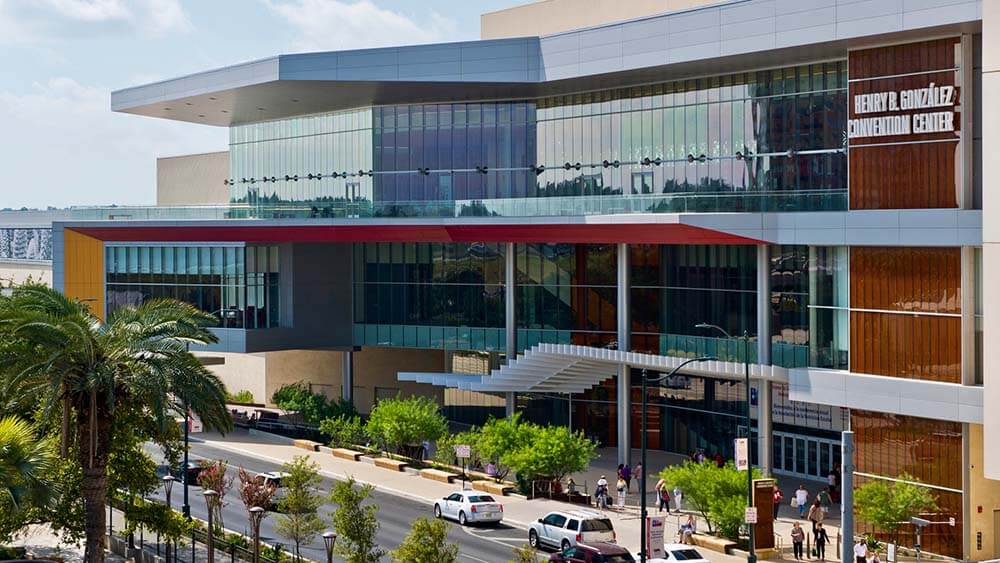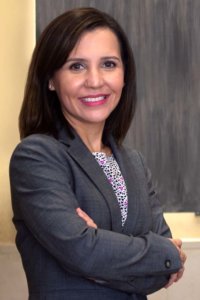
Officials recently announced that San Antonio’s Henry B. Gonzalez Convention Center will host U.S. Travel Association’s 2023 IPW, the first time the city will host the travel industry event. (Al Rendon/Visit San Antonio)
As director of convention and sports facilities for the City of San Antonio, Patricia Muzquiz Cantor has not one but multiple venues under her leadership, including the Henry B. Gonzalez Convention Center, Alamodome, and the Carver Community Cultural Center. And from her 20 years working at the city’s venues, where she has held a number of roles in management and finance, Cantor has the kind of institutional knowledge that organizations need and value now more than ever in the wake of the industry’s growing talent crisis. Below, Cantor shares how her team is working to attract and retain employees, the best piece of advice she’s received during her career, and how she counsels young people entering the industry.
In our August 2022 cover story, we explore how the talent shortage continues to affect the business events industry. Can you share what the recent experience has been for your team when it comes to attracting and keeping talent?

“Things are changing, and we must adapt.”
— Patricia Muzquiz Cantor
We have worked to be innovative to attract new talent. In particular, over the past several weeks, we have been conducting one-on-one meetings with staff to improve the working environment here, with a focus on retaining talent. We know that when we lose some of that talent, it is institutional knowledge going out the door.
Everybody is having a difficult time attracting talent, including our partners. They’re having to increase their hourly rates to meet the staffing numbers we request. Internally, managers are working closely with our HR department to post positions not only on our websites and social-media platforms, but in other areas, such as on our marquee to let people know that we are hiring. Applicants can also apply for various positions all at once and we have created committees that are interviewing individuals and determining their best fit in the organization. This helps applicants reduce the number of times they must show up for an interview.
Do you continue to experience challenges from disruptions in the supply chain and the steady increase in inflation? Has it gotten better or worse recently? Have you found any creative solutions that have helped offset that volatility?
There are definitely challenges. The steady increase in inflation has impacted our budget. We must be creative in how we manage that budget. The supply-chain disruptions have also impacted some of the capital-improvement projects that we are working on. We plan as much as possible to offset the volatility. Things have improved somewhat, however. Lately we’ve seen a rise in applicants but also in the availability of more commodities that are essential to our operation and capital projects we are working on.
The meetings and events industry has taken many twists and turns over the last two years. Can you talk a little bit about how you have weathered that personally and from a leadership perspective? Are there ways in which you find thinking differently as a result of the ongoing challenges to the meetings industry?
It’s been tough, but I have the support of a great team. It’s made all the difference, and I’m grateful for the support. Our people are passionate about what they do. It includes our partners, our work family, everyone — it’s a one-team philosophy. I’m surrounded by people I can depend on, and how else would we make it? We work to be innovative. Things are changing, and we must adapt. We are in constant contact with customers coming into our building, offering more coordination to meet a lot more demands.
What’s the best piece of advice you were given in your career journey?
The best advice is: You’re not going to know 100 percent of the job; rely on the skills you have gained and build your knowledge with every experience.
If you had a chance to do it all over again, is there anything you would change in how you prepared for this career — e.g., chose a different major, applied for more internships, found a mentor earlier, etc.? And do you have any advice for young people facing those decisions right now?
My background is in finance, and this has been a journey of learning the whole operation. It’s been a learning experience and a challenge, but I love it. It never gets old; there’s always something new to learn. I would tell young people entering this industry to learn as much as possible from those who have institutional knowledge. There are many people who returned after COVID, but a lot of institutional knowledge that is leaving the industry. You must have the mindset to learn as much as you can.
Jennifer N. Dienst is senior editor at Convene. This interview has been edited for brevity.
More Women Leaders
Find more stories from Convene Senior Editor Jennifer N. Dienst’s continuing series on women leaders at convention centers.
